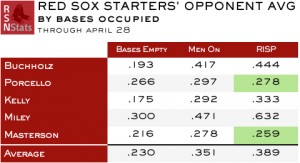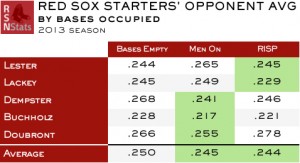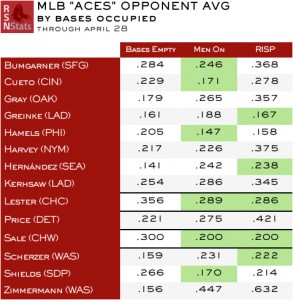Thanks to the power of the Internet your correspondent stays current on Red Sox news even though he’s more than 2,300 miles from the epicenter of the Nation.
In the aftermath of Clay Buchholz‘ latest meltdown Tuesday, a radio station in Boston was remarking on the incredible jump in opponent batting averages when Buchholz has men on base, and how it is even higher when runners are in scoring position (i.e., on second or third base and abbreviated as “RISP”).
To this point, we’ve all talked about the failure of Red Sox pitchers to go deep into the game. But just how much of an impact are pressure situations on Red Sox pitchers this season?
These are the kinds of conversations that get me thinking. So I decided to have a look at how all Red Sox starters are doing depending on how the bases are occupied. And the results, not surprisingly, are pretty ugly.
 In this table the opponent’s AVG is shaded in green when it is either at or below the opponent average in the less tense situation. For example, if the opponent batting average is lower when men are on base than when the bases are empty, it is shaded in green. As you can see, there are no such situations currently with the Red Sox. Similarly, if the opponent batting average is lower with RISP than just when men are on base, it’s shaded in green. That’s the case for both Rick Porcello and Justin Masterson thus far.
In this table the opponent’s AVG is shaded in green when it is either at or below the opponent average in the less tense situation. For example, if the opponent batting average is lower when men are on base than when the bases are empty, it is shaded in green. As you can see, there are no such situations currently with the Red Sox. Similarly, if the opponent batting average is lower with RISP than just when men are on base, it’s shaded in green. That’s the case for both Rick Porcello and Justin Masterson thus far.
The fact is, without exception, all Red Sox starters are allowing a higher batting average by opponents when the bases are occupied and 3 of 5 of them are being hit even worse with RISP.
It’s worth noting that “men on” including “runners in scoring position.” In this analysis I didn’t compare opponent batting averages when men are on first base but not second and/or third.
Against Red Sox starters this season opponents are averaging .230 with the bases empty, .351 with men on, and a staggering .389 with RISP.
 For sake of comparison, let’s view that against the pitching performance of the 2013 Championship season, where opponents’ batting averages were .250, .245, and .244 respectively.
For sake of comparison, let’s view that against the pitching performance of the 2013 Championship season, where opponents’ batting averages were .250, .245, and .244 respectively.
In that special season, Buchholz, Ryan Dempster, and Felix Doubront each exhibited better performance with men on base than when the bases were empty. Though he appeared in just 16 games that season, when the Red Sox were trailing Buchholz limited opponents to a .230 average while this season opponents are hitting him at .485 in such situations.
Around the league
It may seem likely to you that opponents will hit better with the incentive of driving men in, but it’s also just as likely that a pitcher will bear down to avoid that possibility.
To test that thought, here’s a similar look thus far in the 2015 season at some of the best pitchers in the league.
 As the analysis indicates, for 6 of the 14 “aces,” opponent batting averages stay the same or go down with the bases occupied, in some cases dramatically so. Take, for instance the White Sox’ Chris Sale and Padres’ James Shields, for whom opponent AVGs fall by .100 and .096, respectively.
As the analysis indicates, for 6 of the 14 “aces,” opponent batting averages stay the same or go down with the bases occupied, in some cases dramatically so. Take, for instance the White Sox’ Chris Sale and Padres’ James Shields, for whom opponent AVGs fall by .100 and .096, respectively.
Of the pitchers analyzed two stand out: Sale and the Cubs’ Jon Lester. For them, not only do opponent AVGs drop with men on base, they drop even more with RISP.
Tuesday’s tally of 8 runs on 13 hits should have been enough for assure a Red Sox win. From 2000-2014 Boston is 490-46 (.914) when scoring 8+ runs, 259-26 (.909) when doing so at home.
But the consistently bad outings for Red Sox pitching continues to take its toll on the bullpen and club’s chances for a successful 2015 campaign.
